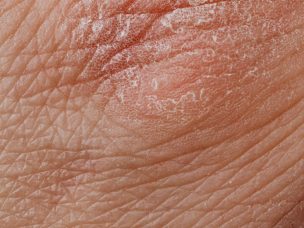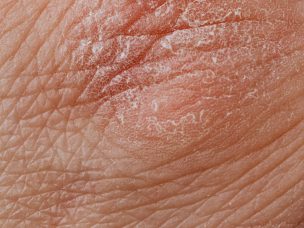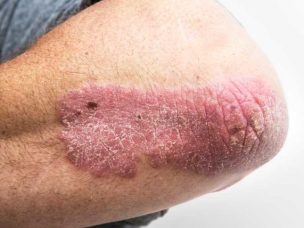Psoriasis
Current Challenges and Future Prospects in the Treatment of Psoriasis
There are many positive developments in psoriasis treatment. Novel biologics such as interleukin 23 inhibitors and small molecule inhibitors provide improved effectiveness and a wider range of choices. Progress in topical treatments utilizing microneedles and nanoparticles enhances drug delivery, while personalized medicine directed by biomarkers offers the possibility of customized therapy and improved results. Psoriasis...
Ixekizumab-Induced Urticaria Linked to Shorter Psoriasis Remission
A recent retrospective analysis reveals that ixekizumab-induced urticaria in psoriasis patients is associated with a shorter duration of remission, suggesting a role of mast cell activation in this process. The findings emphasize the need for targeted management strategies for patients exhibiting these adverse reactions. Ixekizumab treatment in psoriasis patients may lead to urticaria and early...
Psoriasis vs Eczema: A Comprehensive Comparison
Dealing with itchy, red, and dry skin can be a frustrating experience, especially if you’re unsure whether it’s eczema or psoriasis. Although they may exhibit similar symptoms, eczema and psoriasis are distinct skin conditions with unique characteristics and treatment approaches. In this article, we will comprehensively compare psoriasis and eczema, exploring their causes, symptoms, diagnosis,...
Comparing the Long-Term Effectiveness of Infliximab and Adalimumab for Psoriasis
Based on Kaplan–Meier analysis, the survival time for infliximab is comparatively longer than that for adalimumab; however, there are no significant differences between the two drugs based on retention rate, with their efficacy diminishing over time. Psoriasis can be described as a chronic immune-mediated disorder that requires lifelong treatment. A drug’s survival and retention rates...
Secukinumab for Pediatric Psoriasis Treatment
Secukinumab, a fully human monoclonal antibody that targets IL-17A, is a promising treatment option in pediatric patients aged 6 years and above with moderate to severe plaque psoriasis. Psoriasis is a chronic and inflammatory skin disease that affects 1% to 5% of the global population. It is caused by T-cell activity and genetic and epigenetic...
Diet-Induced Inflammation Not Linked to Psoriasis
Dietary inflammatory index not linked to psoriasis in participants with different population settings Diet-induced inflammation seems not to be associated with psoriasis, according to a study published online Jan. 26 in the Journal of Dermatology. Nouzhou Liu, from Sichuan University in Chengdu, China, and colleagues examined the association between the dietary inflammatory index (DII) and incident...
AI Model Differentiates Scalp Psoriasis From Seborrheic Dermatitis
A deep learning (DL) model based on dermatoscopic images can differentiate scalp psoriasis from seborrheic dermatitis, according to a study recently published in Frontiers in Medicine. Zhang Yu, from Inner Mongolia Medical University in Hohhot, China, and colleagues developed a new diagnostic method for discriminating scalp psoriasis and seborrheic dermatitis based on a DL model. A...
Psoriasis Tied to Elevated Risk for Celiac Disease
People with psoriasis have double the odds of celiac disease versus people without psoriasis Individuals with psoriasis have double the odds of having celiac disease (CD) versus individuals without psoriasis, according to a research letter published online Feb. 9 in the Journal of the American Academy of Dermatology. Marina Z. Joel, from the Johns Hopkins...
Patient's Mental Health Impacts Rating of Psoriasis Severity
WEDNESDAY, March 3, 2021 (HealthDay News) — Discordance between patient and physician assessments of psoriasis severity is associated with patient depression and anxiety, according to a study published online March 3 in JAMA Dermatology. Ewan Carr, Ph.D., from King’s College London, and colleagues conducted a cohort study to examine discordance between patient- and physician-reported measures...
More Medical News














